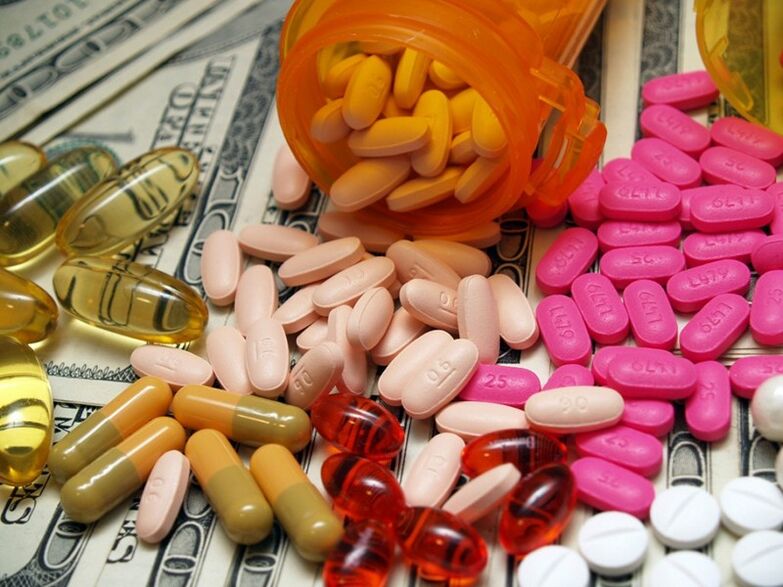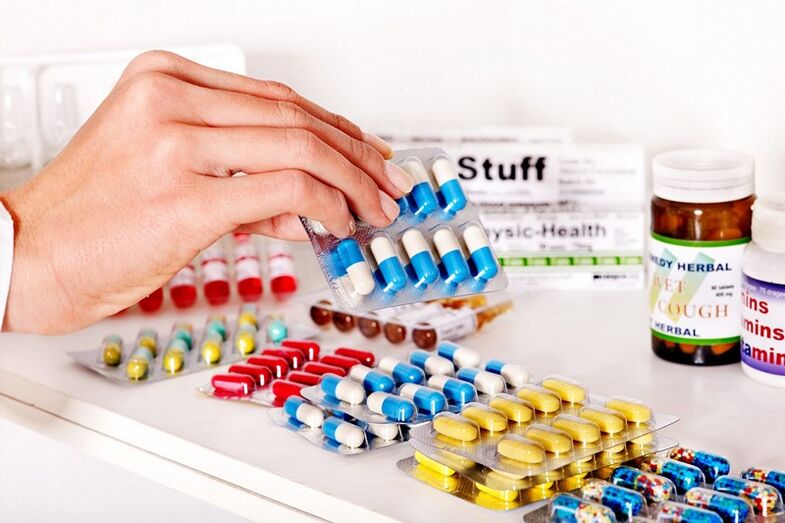Effective medications for prostatitis are available in the form of tablets, injections or suppositories. Considering the patient's condition, the doctor may also prescribe micro-enemas and alpha-blockers. Which drugs are the most effective for prostatitis is decided by the doctor in each specific case, depending on the severity of the symptoms, the degree of neglect of the disease and the results of the tests.

Antibacterial drugs
In the presence of prostatitis, which is caused by the activity of pathogenic microorganisms, doctors prescribe antibacterial drugs. The most commonly used drugs are in the form of tablets, injectable solutions or rectal suppositories with a broad spectrum of action.
Rectal suppositories work faster, acting directly at the injection site. Such drugs for prostatitis eliminate the severity of pain and have bactericidal properties.
Injectable solutions are the most effective because they are quickly absorbed into the tissues, have a systemic effect, activate the immune system and improve the permeability of the vascular walls. Such drugs for the treatment of prostatitis are prescribed only by a doctor, after preliminary diagnostic measures, based on the patient's complaints. Injections are given only in medical facilities.
Anesthetics
With prostatitis, painful sensations appear in the prostate gland. To get rid of such symptoms, the doctor prescribes painkillers.
The treatment regimen for these drugs should be prescribed by a doctor, based on preliminary tests. It is necessary to adhere to the dosage and the duration of the course of treatment in order to exclude an overdose or the body to get used to such drugs.
Alpha blocker group
The use of these drugs is due to the need to relieve spasm in the smooth muscles of the urethra and bladder. After muscle relaxation, bladder emptying function improves, urine flow improves and the patient feels much better.
Such drugs do not relieve male diseases. They are intended only for the elimination of unpleasant clinical manifestations of diseases. In this case, their use is aimed at improving the emptying function of the bladder in order to eliminate fluid retention.
Use of muscle relaxants
Such drugs do not treat the inflammatory process in the prostate gland. They are similar in effectiveness to alpha-blockers. They relieve the spasm only in the perineum area, since this area is systematically tense during the development of prostatitis.

Thanks to muscle relaxants, the compression on the pelvic organs is reduced and the pain is reduced. But the inflammation is not eliminated; such drugs are not used as independent treatments, only in complex treatment.
Means for improving blood circulation
Any disease is often accompanied by deterioration of the microcirculation of blood fluid. The result of this is stagnation in the organs of the reproductive system, the tissues are not capable of regeneration. Therefore, complex treatment also includes the use of drugs whose mission is to normalize blood circulation.
To restore the full filling of the blood vessels and ensure the outflow of fluids, doctors prescribe drugs such as vasoprotectors.
Use of herbal medicine
Treatment with such drugs is part of complex therapy. This is an effective method for eliminating congestion, reducing swelling and hyperemia of mucous membranes and organ tissues, and reducing the severity of the inflammatory process. Such treatments help with acute and chronic prostatitis.
The most common in this group are products containing pumpkin and the fruits of the creeping palm. Folk remedies (for example, propolis or honey) can be used to treat prostatitis only after prior consultation with your doctor. They are not independent methods of treatment. The most commonly used beekeeping products are honey and propolis.
Vitamins
The use of multivitamin complexes helps to strengthen the body's natural protective functions, since they are weakened by the fight against the inflammatory process. Therefore, in addition to basic drugs, doctors prescribe multivitamin complexes for men.
Use of medicine based on prostate extract in injections
This drug is considered one of the best in the treatment of prostate inflammation. Thanks to this, the activity of the muscular apparatus of the bladder and glands increases, blood circulation in the tissues of the organs improves and the immune system is stimulated. The main indications for the use of the drug are: the presence of chronic prostatitis, adenoma, urinary outflow dysfunction.
It is not allowed to use the product if you have individual intolerance; no side effects were noted. The drug is administered intramuscularly, the duration of treatment and dosage are prescribed by the attending physician.

Application of suppositories with bovine prostate extract
Rectal suppositories work quickly. They are used in the presence of chronic prostatitis or after surgical treatment of the organ. Suppositories have an antibacterial and anti-inflammatory effect, with their help the process of emptying the bladder is improved, the risk of thrombosis in the vessels of the prostate is reduced and the quality of ejaculation is increased.
Use of a drug based on creeping palm fruit extract
This drug has a positive effect on the functions of the reproductive system, relieves inflammation and acts as an anti-exudative and anti-androgenic substance. It is used to get rid of prostate adenoma of the first and second stage, as an additional drug as part of complex therapy. It is used after meals. Doses and duration of treatment are prescribed by the attending physician.
Use of pumpkin seed oil medicine
It is one of the effective drugs in the treatment of prostatitis. It is made from pumpkin seed extract. It is used as a diuretic, relieves pain, helps restore erectile function. Since this drug is of herbal origin, its use should be long-term; it has a cumulative, prolonged effect. Doses and duration of treatment are prescribed by a doctor.

































